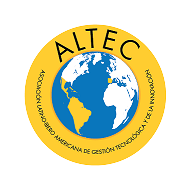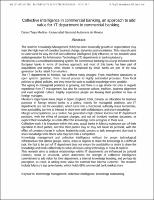| dc.description.abstract | The need for Knowledge Management (KM) has been drastically growth so organizations may meet the high level of complex business change, dynamics and uncertainty. This research aims to understand the way the KM and collective intelligence (CI) influence, or not, towards value added generation for Information Technology (IT) departments in banking industry. Mexico has a consolidated banking system; for commercial banking has a large influence from European banks in terms of business approach, and most of this banks has been part of acquisitions and merges, other cluster is composed by small banks are part of the new generation banks raised from retailers. The IT departments in Mexico, has suffered many changes: From mainframe operations to open systems operation, from manual process to highly automated processes, from local policies to global policies, and they move for tacit to explicit knowledge when possible. The ageing in managerial positions is growing, and there is a age divide not only in regards experience from IT management, but also for corporate culture, tradition, business alignment and even regional culture. Highly experience people are leaving their position to new or foreign managers. Mexico’s major banks have origin in Spain, England, USA, Canada, so relocation for business purposes in foreign related banks is a policy, mainly for managerial positions, and IT departments are not the exception; which turns into a functional, authority-status hierarchies, time availability barriers to interact in short term with collaborators, and share knowledge. Merges and acquisitions, as a context, has generated a high rotation level in mid IT department positions, with the effect of constant changes, and not all involved workers document, or explicit their knowledge, in a tide effect the knowledge come and gone in those area. Collective work it is important within this area, actual banks in Mexico outsource part of their operation to third parties, and this third parties may or may not rotate its personal, with the effect of constant change in culture, leadership style, process or task arrangement, due trust to share knowledge with others who may turn into a competitor. Knowledge management and collective intelligence without the proper technological infrastructure that allows groups, teams, areas or regions to share the knowledge is a difficult task; the fact to be part of IT department does not ensure the availability or desire to share the knowledge and work collectively to solve all issues using technology to make it explicit. This research aims to analyze relationships within IT departments are influenced by cultural contexts, social or structural, which determines the strength of collective intelligence commitment to add value for their department, a internal knowledge bonding, and perhaps its perception, as result, is adding more value for external than internal customer. The research include Mexico´s top seven banks, which holds 68% commercial bank market share | |


